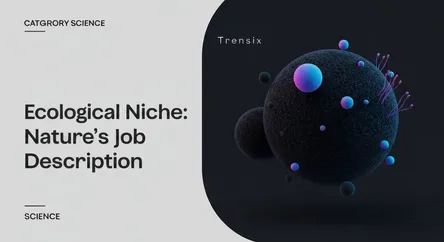Science
Ecological Niche: Nature's Job Description

An explanation of an organism's unique role, or niche, within its ecosystem and why this concept is vital for understanding biodiversity.
What is it?
In ecology, a niche is the specific role a species plays within its ecosystem. It's more than just its habitat, which is like its address; the niche is its profession or "job." This includes how it gets food and shelter, how it survives and reproduces, and all its interactions with living (biotic) and non-living (abiotic) factors in its environment. A species' niche encompasses its diet, predators, the climate it can tolerate, and how it, in turn, shapes its surroundings. According to the Competitive Exclusion Principle, no two species can occupy the exact same niche in the same habitat for long.
Why is it trending?
The concept of the ecological niche is fundamental to understanding how complex ecosystems function and maintain stability. With growing concerns about climate change and habitat loss, studying niches helps scientists predict how species might be affected and how ecosystems might change. It explains the incredible biodiversity we see, as species adapt to occupy different niches to avoid competition, a process called niche partitioning. This allows many different species to coexist. Understanding these roles is crucial for conservation efforts and managing natural resources effectively.
How does it affect people?
Each species' niche contributes to the overall health and balance of ecosystems, which provide essential services to humans. For example, the niche of dung beetles involves breaking down waste, which recycles nutrients back into the soil, benefiting agriculture. Pollinators occupy a niche vital for crop production. When a species is removed from its niche, it can have cascading effects on the ecosystem, potentially impacting food sources, water quality, and the environment's resilience to change. Understanding ecological niches is therefore key to preserving biodiversity and the natural services that support human life.